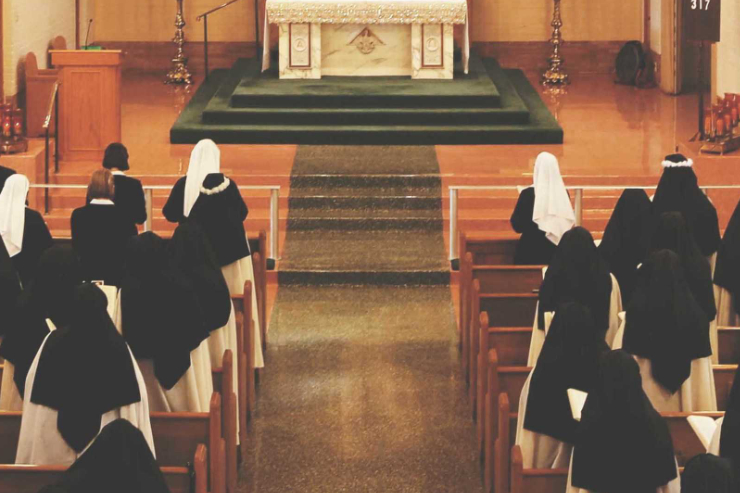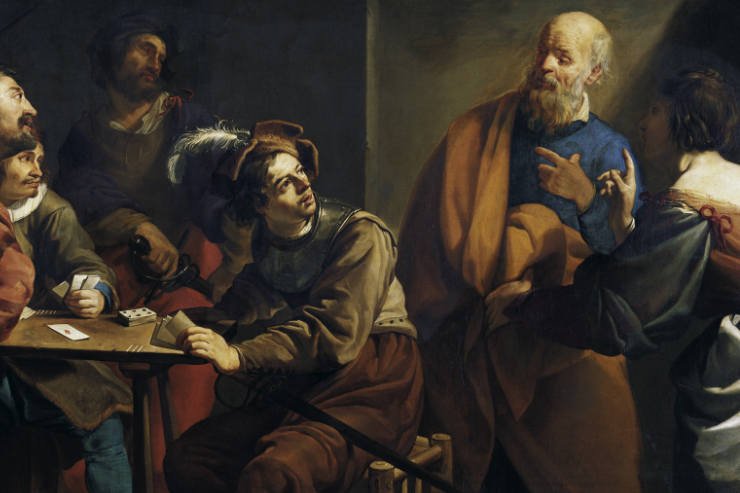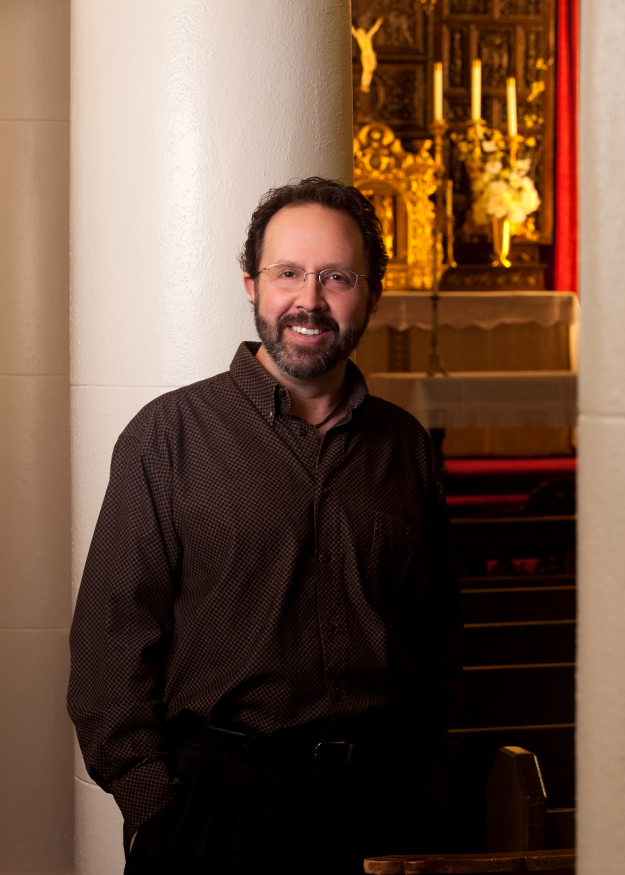 People once lined up for “Cabbage Patch” dolls and “Tickle Me Elmos” before Christmas. I haven’t a clue what the gotta-have-it Christmas item is this year but there’s always a line forming somewhere for that special something.
People once lined up for “Cabbage Patch” dolls and “Tickle Me Elmos” before Christmas. I haven’t a clue what the gotta-have-it Christmas item is this year but there’s always a line forming somewhere for that special something.
That’s exactly what Catholics used to do to go to confession on Saturdays—they got in line. Then, the “sixties” hit. All of a sudden a lot of people did not feel the need to go to confession. I do not think there were less sins being committed at this time, just fewer people feeling the need to confess them.
Confession Fell by the Wayside
Technically, my teen years happened during the “seventies”, so I merely followed in wake of the wave that swept a lot of Catholics away from the sacraments. When I began reading and learning about my faith on my own, I often stopped and wondered, Why didn’t I know this before? Whatever the reason, I was not the only one not showing up for confession anymore.
It was easy to convince myself I was good because I was nice. But being nice does not mean being sinless. We can’t grow holier when we throw out confession, stop examining our consciences, and stop trying to improve by overcoming failures. Obviously, I was clueless on many things back then. But surely, the first time I missed Mass, I must have thought about it and just decided I wasn’t going to go. I thought I had better things to do. That meant I was guilty of breaking the First Commandment. “I am the Lord thy God, thou shall have no gods before me.” Every time I made something more important than God, I put other things before Him. I had time for college and graduate school, friends, work, vacations…but I found no time for reading the Bible and only occasionally went to Mass. I filled my life with everything but God.
Then there was the Second Commandment: “Keep Holy the Sabbath.” Well, there went another one. Actually, if I had taken the time to go down the list, I would have realized that following the Ten Commandments was not exactly “my thing.” Yet, I thought of myself as a good person. Why did I have time for every sort of self-improvement except the only one that really mattered—the soul?
We all sin. “Sin is before all else an offense against God, a rupture of communion with him. At the same time it damages communion with the Church. For this reason, conversion entails both God’s forgiveness and reconciliation with the Church, which are expressed and accomplished liturgically by the sacrament of Penance and Reconciliation.” (CCC 1440)
As I became a real Catholic—one who learned what the Catholic Church taught and then followed it—I began to actually want to go to confession (also known as reconciliation or penance) and see the need. After so many years away though, I was nervous. When I did finally make my way to the confessional, I opened the door with the green light over it and stepped inside. It was pitch black. I felt my way to the kneeler and then waited. Then, I heard a door next to me open and close. “Oh good heavens!” I realized. The priest just left. If I stepped out right away, I felt it would be embarrassing to have the priest see me. But if I waited a few minutes until he was gone, the people already in church waiting for 5:00 Mass would wonder what the weirdo was doing in an empty confessional. Oh, this was not a good return to confession for me.
I waited a couple minutes and then with as much casualness as I could muster, I strolled out. I noticed the other confessional doors had lights on. As an amateur at this, I did not realize that at our church, the priest saying the 5:00 Mass left at 4:30 to get ready and the other priest took over. Well, I’ve come this far, I figured, so I followed through and went to confession. It was not so bad after all. As a matter of fact, it was great and I’ve been going regularly ever since.
The Gift that Keeps Giving
Now that I know my Catholic faith so much better, I understand that the sacrament of confession not only takes away sin, but it also fills us with grace. This brings us closer to God and strengthens us so we will be more resistant to sin. The sacrament is a gift from God. Not receiving it is not only rude, it’s plain stupid.
This is a gift like no other. There’s nothing in the shopping lines that compares with what you can get through this sacrament:
– reconciliation with God by which the penitent recovers grace;
– reconciliation with the Church;
– remission of the eternal punishment incurred by mortal sins;
– remission, at least in part, of temporal punishments resulting from sin;
– peace and serenity of conscience, and spiritual consolation;
– an increase of spiritual strength for the Christian battle. (CCC 1496)
The Catholic Church recommends daily examination of sins and confession to God during prayer time. The sacrament of confession is required of anyone guilty of serious sin– mortal sin–before reception of communion. Mortal sin separates us from God by destroying sanctifying grace in our souls. It is spiritual death; loss of the soul’s sanctifying grace. Confession brings our soul back to life in Christ.
The Church teaches that for a sin to be mortal, it must be a grave matter, which is committed with full awareness and deliberate intention. An individual must see the sin as serious, and intentionally commit it anyway.
Not all denominations recognize there are two kinds of sin; mortal and venial. (By the way, missing Mass intentionally is considered a grave sin.) This Catholic teaching is supported in scripture:
“Now the works of the flesh are obvious: immorality, impurity, licentiousness, idolatry, sorcery, hatreds, rivalry, jealousy, outbursts of fury, acts of selfishness, dissensions, factions, occasions of envy, drinking bouts, orgies, and the like. I warn you, as I warned you before, that those who do such things will not inherit the kingdom of God” (Gal 5:19-21).
“If anyone sees his brother sinning, if the sin is not deadly, he should pray to God and he will give him life. This is only for those whose sin is not deadly. There is such a thing as deadly sin, about which I do not say that you should pray. All wrongdoing is sin, but there is sin that is not deadly” (1 John 5:16-17).
The confession of venial faults are not necessary but are strongly recommended by the Church as a way to make reparation and strengthen ourselves spiritually. Venial sin weakens charity within us and interferes with the soul’s progress. It erodes our friendship with Christ but does not destroy it. The further our relationship with Him is eroded, however, the greater the likelihood that we will fall into mortal sin.
Only One Mediator
Some non-Catholics criticize the sacrament of Confession stating: “There is only one mediator between God and man, Jesus Christ.” (1 Tim. 2:5) This is an easy one to answer.
Jesus gave the apostles the power to forgive sins. “…He breathed on them, and said to them, ‘Receive the Holy Spirit. Whose sins you forgive are forgiven them, and whose sins you retain are retained” (John 21:22).
Just prior to giving His apostles the power to forgive sins, Jesus sent them out into the world to act in his place: “As the Father sent me, so am I sending you.” It is important to note Jesus used the word “you,” not “God,” when giving the apostles personally this power. Only God can forgive sins, but here, He was giving God’s power to be used by them.
Jesus bestowed this power on the apostles on Easter Sunday by breathing on them. The only other time the Bible mentions God breathing on anyone was in Genesis 2:7 when He breathed life into the first human beings. Likewise, confession breathes new life into our souls.
The apostles were given the authority to both stand in for Jesus and forgive sins. It is true that Jesus said He is the only mediator between man and God, but Catholic confession does not contradict that passage. We do not confess our sins to a priest instead of to Jesus. The priest is standing in for Jesus. He does not distance us from Christ but rather brings us closer by acting as God’s representative to be physically present and give us forgiveness and comfort. We are actually facing Jesus and confessing our sins to Him.
St. Paul explains how the Apostles are ambassadors of Christ’s work of reconciliation: “So whoever is in Christ is a new creation: the old things have passed away; behold, new things have come. And all this is from God, who has reconciled us to himself through Christ and given us the ministry of reconciliation, namely, God was reconciling the world to himself in Christ, not counting their trespasses against them and entrusting to us the message of reconciliation. So we are ambassadors for Christ, as if God were appealing through us” (2 Cor. 5: 17-20).
Also, He told them, “Amen, I say to you, whatever you bind on earth shall be bound in heaven, and whatever you loose on earth shall be loosed in heaven” (Matt 28:18).
Only the apostles were told this, not the crowds that came to listen to Him. Jesus gave them the power to bind and loose. Forgiving one’s sins is loosing their sins. Jesus forgave sins during his time on Earth and gave that power to the apostles for the time He would no longer be here. That power has subsequently been passed on to keep the Church as Jesus established it, because the apostles would not always be on Earth either. The power is from God.
Some religions teach that by accepting Jesus as our Savior, we partake in the forgiveness of all our sins, past, present and future, based on His sacrifice on Calvary. But if God has already forgiven all man’s sins, past and future, on a single act of repentance, then it makes no sense to tell the apostles they have been given the power to forgive or retain sins. It does, however, make sense that the Church, established by Jesus to perpetuate His work would provide reconciliation of sinners by His appointed ministers.
It follows… that the power of forgiving sins, on the part of God’s minister, involves the obligation of confessing them on the part of the sinner. “Many of them who believed came confessing and declaring their deeds.” (Acts 19:18).
Of course we must be sorry for our sins and confess them first, but then forgiveness does not erase the need to make up for the wrongdoing.
If we break a window or do damage, to simply say we are sorry and make no attempt to repair the wrong is seen as an insincere apology. To be truly sorry for what we have done gives us the desire to make it up. Doing penance is a logical response on our part when we seek forgiveness.
St. Augustine writes: “Our merciful God wills us to confess in this world that we may not be confounded in the other.’ And again: ‘Let no one say to himself, I do penance to God in private, I do it before God. Is it then in vain that Christ hath said, ‘Whatsoever though shall loose on earth shall be loosed in heaven?’ Is it in vain that the keys have been given to the Church? Do we make void the Gospel, void the words of Christ?”
The Advent Season is a time of preparation for Christmas. Going to confession and taking our children is one of the best ways to prepare for such a holy day. The good news is that people are returning to this sacrament, so there are often lines again. But this is gift for which it is well worth getting in line.
Refresher Course
If you have not seen the inside of a confessional in awhile, understand that the priest will be happy to see you. Here is a refresher for those that have not gone in awhile.
Before going to Confession, make a thorough examination of conscience. Consider the commandments, especially the two Jesus gave us, to love God with our whole heart and soul and to love our neighbor as ourselves.
“The movement of return to God, called conversion and repentance, entails sorrow for and abhorrence of sins committed, and the firm purpose of sinning no more in the future. Conversion touches the past and the future and is nourished by hope in God’s mercy.” CCC1490
The priest welcomes you. You make the sign of the cross, usually together with the priest. Begin your confession, “Bless me Father, for I have sinned. It has been (how long?) since my last confession. These are my sins… Begin with any mortal sins, as these MUST be confessed. To intentionally hold a mortal sin back out of fear of embarrassment, we have committed another. Use a confessional with a screen or go to a church where the priest does not know you if it helps, but do not withhold a serious sin.
Then, listen to any advice the priest gives you and accept the penance he gives you to diminish the temporal punishment due to your sins. You will then make an act of contrition prayer, (the priest usually asks you to do this.) There are several forms.
The priest will say: “God the Father of mercies, through the death and resurrection of His Son has reconciled the world to Himself and sent the Holy Spirit among us for the forgiveness of sins: through the ministry of the Church may God give you pardon and peace, and I absolve you from your sins, in the name of the Father, the Son, and the Holy Spirit.”
You respond, “Amen.” The priest will tell you to go in peace, and you should respond, “Thank you, Father.”
If at any point you forget the format or get stuck, the priest will guide you along. This is not a test; so as long as you are truly sorry for your sins, you cannot flunk.
As a final note, you might wonder, if only Catholics have the sacrament of confession then are all people of other faiths who are guilty of mortal sin doomed to hell? The Church teaches (at the Council of Trent, 1551) that all people outside the Catholic Church must have perfect contrition in order to have their sins forgiven and grace restored, since most do not have the Sacrament of Reconciliation available to them. We, as Catholics, do have this gift, however. It’s free and one-of-a kind. And unlike anything at the stores, you really can take this one with you in the end.













